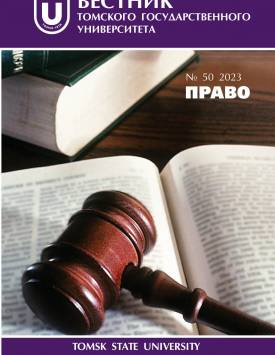Current thinking on private law concepts
We still have no concept of family in the law. And this is only one of the very visible indicators of the real state of the categorical apparatus in private law. But it is hardly appropriate to limit ourselves to an unambiguous assessment and a private case does not turn into a general rule. The absence of a legal or at least acceptable doctrinal concept is usually not given importance. This is not surprising. The situation with the conceptual apparatus in private law doctrine is clearly unsatisfactory, although the issue is usually not directly emphasised. A huge scientific base has been created by the works of well-known specialists in the field of Soviet family law (A.M. Belyakova, E.M. Vorozheikin, J.R. Webers, O.S. Ioffe, N.M. Ershova, G.K. Matveev, A.M. Nechaeva, A.M. Rabets, Ya.N. Shevchenko). There is confidence in the validity and sustainability of the concept of development of family legislation for the future. At the same time, it is necessary to recognise fair and critical assessments of the quality of family legislation on certain important issues. Since there is no longer any debate about the inclusion of family law in the system of private law, new tasks arise. The main one is to ensure the quality and effectiveness of legislation that meets the needs of society. The literature suggests the development of a system of concepts reflecting the specifics of family law. The central place among them is, of course, given to the concept of family. O.S. Ioffe qualified this concept as a fundamental branch concept in the system of legal concepts. Fundamental and other branch concepts, branch theoretical constructions form "a single, well-established mechanism, a system that is structured in all its subdivisions". In our science it is customary to highlight in the content of a concept its essential features. In relation to the concept of family, there are several such attributes, some of them have a legal nature, others are of a different nature. Sociologists understand family as an association of persons, community of persons, union, small collective. In other words, according to their terminology, the family is a small social group. The next attribute of the family is considered to be the basis, i.e. legal facts that condition its emergence (marriage, kinship, etc.). The essential legal attribute of the concept of family is the mutual legal connectedness of its members. Finally, the fourth essential feature is the community of life, which is characterised as a complex phenomenon. Its components, and there are several independent ones, including legal ones, can be legally irrelevant. As a result, the doctrinal concept of family is defined as follows. Family is a small social group (association, union of persons) based on marriage, kinship, adoption and other forms of taking children for upbringing, connected by the community of life, as well as family rights and obligations. This concept of family differs little from those available in the literature, including those that claim to be legal, but in fact are not. And it is quite natural because the essence of such a complex phenomenon as a family can be expressed only taking into account all its attributes. In legislation, this concept may well be used at any level. The author declares no conflicts of interests.
Keywords
category, criterion, classification, document, evaluation, family, legislationAuthors
| Name | Organization | |
| Manankova Raisa P. | Tomsk State University | loykon@rambler.ru |
References

Current thinking on private law concepts | Tomsk State University Journal of Law. 2023. № 50. DOI: 10.17223/22253513/50/12
